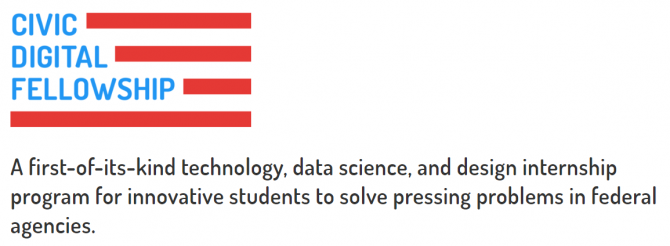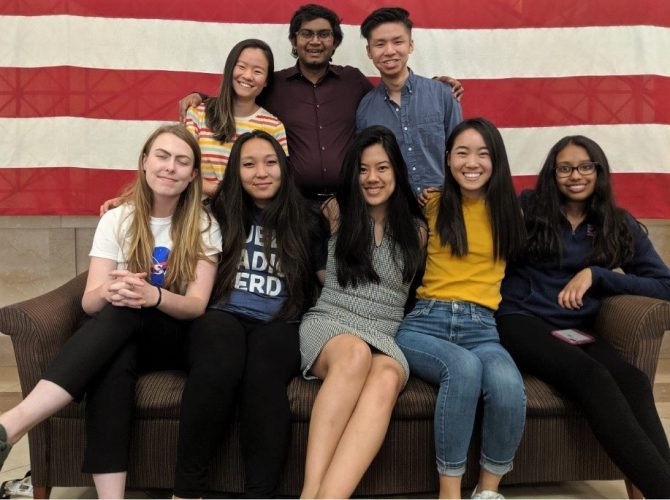In the few months that I’ve had the pleasure of occupying the Commissioner’s seat at the Bureau of Labor Statistics, it’s been clear that I’m surrounded by a smart, dedicated, and innovative staff who collect and publish high-quality information while working to improve our products and services to meet the needs of customers today and tomorrow. And soon after I arrived, we added to that high-quality staff by welcoming a cadre of Civic Digital Fellows to join us for the summer.
In its third year, the Civic Digital Fellowship program was designed by college students for college students who wanted to put their data science skills to use helping federal agencies solve problems, introduce innovations, and modernize functions. This year, the program brought 55 fellows to DC and placed them in 6 agencies – Census Bureau, Citizenship and Immigration Service, General Services Administration, Health and Human Services, National Institutes of Health, and BLS. From their website:

BLS hosted 9 Civic Digital Fellows for summer 2019. Here are some of their activities.
- Classification of data is a big job at BLS. Almost all of our statistics are grouped by some classification system, such as industry, occupation, product code, or type of workplace injury. Often the source data for this information is unstructured text, which must then be translated into codes. This can be a tedious, manual task, but not for Civic Digital Fellows. Andres worked on a machine learning project that took employer files and classified detailed product names (such as cereal, meat, and milk from a grocery store) into categories used in the Producer Price Index. Vinesh took employer payroll listings with very specific job titles and identified occupational classifications used in the Occupational Employment Statistics program. And Michell used machine learning to translate purchases recorded by households in the Consumer Expenditure Diary Survey into codes for specific goods and services.
- We are always looking to improve the experience of customers who use BLS information, and the Civic Digital Fellows provided a leg up on some of those activities. Daniel used R and Python to create a dashboard that pulled together customer experience information, including phone calls and emails, internet page views, social media comments, and responses to satisfaction surveys. Olivia used natural language processing to develop a text generation application to automatically write text for BLS news releases. Her system expands on previous efforts by identifying and describing trends in data over time.
- BLS staff spend a lot of time reviewing data before the information ends up being published. While such review is more automated than in the past, the Civic Digital Fellows showed us some techniques that can revolutionize the process. Avena used Random Forest techniques to help determine which individual prices collected for the Consumer Price Index may need additional review.
- Finally, BLS is always on the lookout for additional sources of data, to provide new products and services, improve quality, or reduce burden on respondents (employers and households). Christina experimented with unit value data to determine the effect on export price movements in the International Price Program. Somya and Rebecca worked on separate projects that both used external data sources to improve and expand autocoding within the Occupational Requirements Survey. Somya looked at data from a private vendor to help classify jobs, while Rebecca looked at data from a government source to help classify work tasks.

Our cadre of fellows has completed their work at BLS, with some entering grad school and the working world. But they left a lasting legacy. They’ve gotten some publicity for their efforts. Following their well-attended “demo day” in the lobby at BLS headquarters, some of their presentations and computer programs are available to the world on GitHub.
I think what most impressed me about this impressive bunch of fellows was the way they grasped the issues facing BLS and focused their work on making improvements. I will paraphrase one fellow who said “I don’t want to just do machine learning. I want to apply my skills to solve a problem.” Another heaped praise on BLS supervisors for “letting her run” with a project with few constraints. We are following up on all of the summer projects and have plans for further research and implementation.
We ended the summer by providing the fellows with some information about federal job opportunities. I have no doubt that these bright young minds will have many opportunities, but I also saw an interest in putting their skills to work on real issues facing government agencies like BLS. I look forward to seeing them shine, whether at BLS or wherever they end up. I know they will be successful.
And, we are already making plans to host another group of Civic Digital Fellows next summer.
 United States Department of Labor
United States Department of Labor